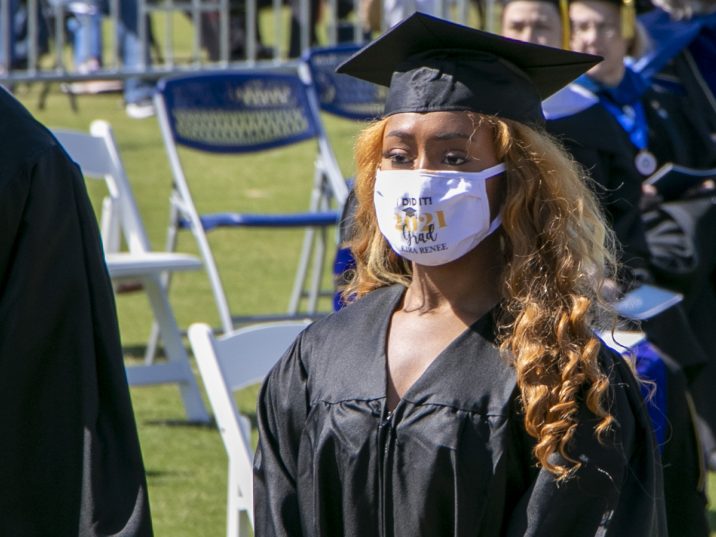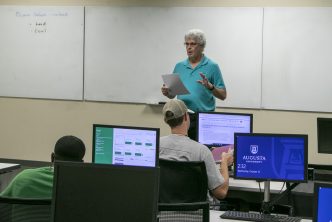The changes in the academic year from COVID-19 were sudden.
At the Hull College of Business in spring 2020, there was a two-day pause in classes in March, as the college held its Case Competition Award Ceremony. And then, the students didn’t come back to Allgood Hall for six months as COVID-19 infections surged throughout the state and nation, creating a lockdown for safety concerns.
Hull College of Business faculty, as did professors for other colleges at Augusta University, had a short period of time to convert their in-person classes into virtual learning to complete the spring semester. Hybrid learning took over during the 2020-2021 academic year, with students and professors wearing masks in Allgood Hall and still relying upon virtual learning.
In the midst of this dramatic change, research-minded professors at the College took the opportunity to study the pandemic for scholarly journals.
In January 2021, Marsha Loda, Ph.D., and Michael Dugan, Ph.D., wrote an article “Is the Next Generation Losing Their Fondness for Technology Because of COVID-19?” for Technology in Society.
Loda and Dugan found this to be interesting given the fact that Generation Z, young adults born between 1997-2012, were dubbed the “Digital Natives,” as they were raised on the internet and social media.
“New qualitative research suggests that a surprisingly large percentage (41.3%) self-report that, due to circumstances related to COVID, they are less fond of technology than they were before the pandemic started,” Loda explained. “Those who are now less fond of technology no longer see their computers as outlets for fun and entertainment. Rather, they equate their devices with work and drudgery.”
The article provided the benchmark for more research on the topic and asks the question – what’s next for a generational cohort having a more negative view of technology during a time when technology is booming?
“As a first step, it seems that more intuitiveness and digital empathy from tech companies and programmers is in order,” Loda said.
At the end of 2020, Chongwoo Park, Ph.D., and a colleague, were published in the Journal of Information Technology Education: Research with “Perception of Instructor Presence and Its Effects on Learning Experience in Online Classes.”
“Better learning experiences are likely to have a significant impact on society’s well-being, and the findings of this study suggest how student learning experiences can be improved in online classes,” Park said.
Park concluded that the use of an interactive communication tool in online learning fosters strong student-instructor interactions and promotes students’ perceptions of instructor presence which eventually enhances student engagement and satisfaction in online classes.
“Furthermore, this is particularly useful when many face-to-face classes were forced to switch to online classes abruptly during the COVID-19 pandemic as many students, parents, and educators were concerned with online learning experiences,” Park said.
While in-person learning is planned for the upcoming fall semester, returning classrooms to the pre-pandemic normal, faculty still have the opportunity to continue to study the effects that the pandemic had on higher learning.
For further reading:
Park, C. and Kim, D., “Perception of Instructor Presence and Its Effects on Learning Experience in Online Classes,” Journal of Information Technology Education: Research, Vol. 19, 2020: doi.org/10.28945/4611
Marsha Loda, Ph.D., and Michael Dugan, Ph.D., “Is the Next Generation Losing Their Fondness for Technology Because of COVID-19?” Online article: https://hullnews.augusta.edu/2021/01/06/is-the-next-generation-losing-their-fondness-for-technology-because-of-covid-19/







